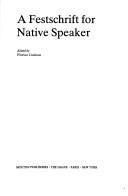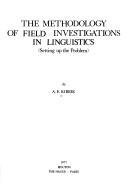| Listing 1 - 10 of 16 | << page >> |
Sort by
|

ISBN: 9783110822878 3110822873 9027934983 Year: 2017 Publisher: Berlin ; Boston : De Gruyter Mouton,
Abstract | Keywords | Export | Availability | Bookmark
 Loading...
Loading...Choose an application
- Reference Manager
- EndNote
- RefWorks (Direct export to RefWorks)
Linguistic informants. --- Linguistic analysis (Linguistics) --- Language acquisition.
Book
Year: 2017 Publisher: Berlin ; Boston : De Gruyter Mouton,
Abstract | Keywords | Export | Availability | Bookmark
 Loading...
Loading...Choose an application
- Reference Manager
- EndNote
- RefWorks (Direct export to RefWorks)
Linguistic informants. --- Linguistic analysis (Linguistics) --- Language acquisition.
Book
ISBN: 9783030462307 Year: 2020 Publisher: Cham, Switzerland : Springer,
Abstract | Keywords | Export | Availability | Bookmark
 Loading...
Loading...Choose an application
- Reference Manager
- EndNote
- RefWorks (Direct export to RefWorks)
This book introduces the concept of the 'native speaker' frame: a perceptual filter within English Language Teaching (ELT) which views the linguistic and cultural norms and the educational technology of the anglophone West as being normative, while the norms and practices of non-Western countries are viewed as deficient. Based on a rich source of ethnographic data, and employing a frame analysis approach, it investigates the ways in which this 'native-speaker' framing influenced the construction and operation of a Japanese university EFL program. While the program appeared to be free of explicit expressions of native-speakerism, such as discrimination against teachers, this study found that the practices of the program were underpinned by implicitly native-speakerist assumptions based on the stereotyping of Japanese students and the Japanese education system. The book provides a new perspective on debates around native-speakerism by examining how the dominant framing of a program may still be influenced by the ideology, even in cases where overt signs of native-speakerism appear to be absent.
English language --- Linguistic informants. --- Study and teaching --- Foreign speakers.

ISBN: 3111351459 9783111351452 9027930767 Year: 2017 Publisher: Berlin ; Boston : De Gruyter Mouton,
Abstract | Keywords | Export | Availability | Bookmark
 Loading...
Loading...Choose an application
- Reference Manager
- EndNote
- RefWorks (Direct export to RefWorks)
Linguistics --- Linguistic informants. --- Informants, Linguistic --- Native speakers as linguistic informants --- Linguistic science --- Science of language --- Language and languages --- Fieldwork. --- Methodology

ISBN: 9027930767 9789027930767 Year: 1977 Volume: 142 Publisher: The Hague: Mouton,
Abstract | Keywords | Export | Availability | Bookmark
 Loading...
Loading...Choose an application
- Reference Manager
- EndNote
- RefWorks (Direct export to RefWorks)
Linguistics --- Linguistic informants --- Linguistique --- Informateurs (Linguistique) --- Fieldwork --- Recherche sur le terrain --- -Linguistic science --- Science of language --- Language and languages --- Informants, Linguistic --- Native speakers as linguistic informants --- Field work --- Methodology --- Linguistic informants. --- Fieldwork. --- -Field work --- Linguistic science --- Linguistics - Fieldwork
Book
ISBN: 902726029X 9789027208149 9789027260291 9789027260291 902720814X 9789027208132 Year: 2021 Publisher: Amsterdam, Netherlands ; Philadelphia : John Benjamins Publishing Company,
Abstract | Keywords | Export | Availability | Bookmark
 Loading...
Loading...Choose an application
- Reference Manager
- EndNote
- RefWorks (Direct export to RefWorks)
"Estimating native-speaker vocabulary size is important for guiding interventions to support native-speaker vocabulary growth and for setting goals for learners of English as a foreign language. Unfortunately, the measurement of native-speaker vocabulary size has been one of the most methodologically contentious areas of research in applied linguistics, with estimates of adults' vocabulary size ranging from 12,000 words to well over 200,000 words. This book reviews over one hundred years of research, critically examining the methodological issues and findings at each age level from young children to adults, and suggesting solutions. It presents a model organising the factors involved in vocabulary growth and is rich in well-researched suggestions for supporting native-speaker vocabulary learning. It concludes with topics for further research. The research shows that we now have a more stable and coherent picture of what and how much vocabulary native-speakers know, and how this knowledge grows throughout their lives"--
Vocabulary. --- Vocabulary --- Linguistic informants. --- Informants, Linguistic --- Native speakers as linguistic informants --- Linguistics --- English language --- Word books --- Words, Stock of --- Diction --- Lexicology --- Research. --- Ability testing. --- Methodology --- Research
Book
ISBN: 9781527540194 Year: 2019 Publisher: Newcastle upon Tyne Cambridge Scholars Publishing
Abstract | Keywords | Export | Availability | Bookmark
 Loading...
Loading...Choose an application
- Reference Manager
- EndNote
- RefWorks (Direct export to RefWorks)
English language --- Second language acquisition --- Linguistic informants --- Study and teaching --- Social aspects
Book
ISBN: 9781800414853 Year: 2022 Publisher: Bristol : Multilingual Matters,
Abstract | Keywords | Export | Availability | Bookmark
 Loading...
Loading...Choose an application
- Reference Manager
- EndNote
- RefWorks (Direct export to RefWorks)
This longitudinal study of motivation in extremely successful learners of English and languages other than English provides unique insights into long-term language learning motivation. It reveals the various factors that sustain multiple language learning and stretches our understanding of motivation beyond the recent theorizing of L2 motivation.
Linguistic informants --- Language and languages --- Second language acquisition --- Multilingual education --- Study and teaching

ISBN: 9027934983 9789027934987 Year: 1981 Volume: 97 Publisher: The Hague: Mouton,
Abstract | Keywords | Export | Availability | Bookmark
 Loading...
Loading...Choose an application
- Reference Manager
- EndNote
- RefWorks (Direct export to RefWorks)
Linguistics --- Linguistic informants --- Linguistic analysis (Linguistics) --- Language acquisition --- Informateurs (Linguistique) --- Analyse linguistique (Linguistique) --- Langage --- Acquisition --- Informants, Linguistic --- Native speakers as linguistic informants --- Analysis, Linguistic (Linguistics) --- Analysis (Philosophy) --- Grammar, Comparative and general --- Acquisition of language --- Developmental linguistics --- Developmental psycholinguistics --- Language and languages --- Language development in children --- Psycholinguistics, Developmental --- Interpersonal communication in children --- Psycholinguistics --- Methodology --- Language acquisition. --- Linguistic informants. --- Linguistic analysis (Linguistics).
Book
ISBN: 0415057213 0415057221 9780415057226 Year: 1992 Publisher: London: Routledge,
Abstract | Keywords | Export | Availability | Bookmark
 Loading...
Loading...Choose an application
- Reference Manager
- EndNote
- RefWorks (Direct export to RefWorks)
Ethnology. Cultural anthropology --- Sociolinguistics --- Linguistic informants --- Linguistics --- Informateurs (Linguistique) --- Linguistique --- Sociolinguistique --- Methodology --- Méthodologie --- --Méthodologie --- --Sociolinguistique --- --Linguistics --- 316:800 --- #SBIB:309H518 --- Sociolinguistiek --- Verbale communicatie: sociologie, antropologie, sociolinguistiek --- Linguistic informants. --- Sociolinguistics. --- Methodology. --- 316:800 Sociolinguistiek --- Méthodologie --- Language and languages --- Language and society --- Society and language --- Sociology of language --- Language and culture --- Sociology --- Integrational linguistics (Oxford school) --- Informants, Linguistic --- Native speakers as linguistic informants --- Social aspects --- Sociological aspects --- Linguistics - Methodology
| Listing 1 - 10 of 16 | << page >> |
Sort by
|

 Search
Search Feedback
Feedback About UniCat
About UniCat  Help
Help News
News